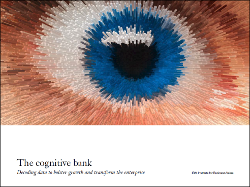Ungated Post | 26 Sep 2016
The cognitive bank: Decoding data to bolster growth and transform the enterprise

Traditional financial services business models are under the microscope. For most financial organizations, sustained profitability is a challenge in today’s lower-interest rate environment. Competition from new market entrants is also generating new layers of disruption, while customer experience and engagement are not keeping pace with much greater expectations of the rapidly evolving digital world.
For success in the digital age, banks must tap the hidden treasure they already own in massive quantities: data. Cognitive systems offer ways to transform beyond traditional banking functions, among other things, using machine learning and applying analytics to data to understand more about the enterprise, customers and competitors. They continually build knowledge and learning, understand natural language, and reason and interact more naturally with human beings than traditional programmable systems.
Oxford Economics’ team is expert at applying advanced economic tools that provide valuable insights into today’s most pressing business, financial, and policy issues.
To find out more about our capabilities, contact:
Americas
Diantha Redd
+1 (646) 503 3052
Email
Asia Pacific
Peter Suomi
+65 6850 0110
Email
EMEA
Aoife Pearson
+44 (0)203 910 8054
Email
Related Services

Post
The economic impact of the sports activities of public service media
This study shows how the sports activities of public service media supported €4.5 billion of GDP and 57,000 jobs across 31 European countries in 2022, taking direct, indirect (supply chain), and induced (wage-funded expenditure) impacts into account. The report also highlights wider economic benefits of public service media sports coverage, such as the way in which it leverages sponsorship income for sports bodies.
Find Out More
Post
Global Trade Education: The role of private philanthropy
Global trade can amplify economic development and poverty alleviation. Capable leaders are required to put in place enabling conditions for trade, but currently these skills are underprovided in developing countries. For philanthropists, investing in trade leadership talent through graduate-level scholarships is an opportunity to make meaningful contributions that can multiply and sustain global economic development.
Find Out More
Post
Mapping the Plastics Value Chain: A framework to understand the socio-economic impacts of a production cap on virgin plastics
The International Council of Chemical Associations (ICCA) commissioned Oxford Economics to undertake a research program to explore the socio-economic and environmental implications of policy interventions that could be used to reduce plastic pollution, with a focus on a global production cap on primary plastic polymers.
Find Out More